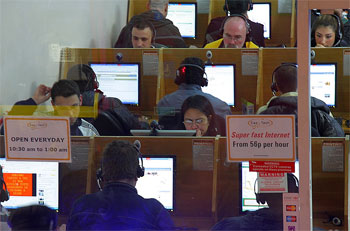Marco Torres
PreventDisease
September 17, 2010
Chalk it up to another delusion from the vast herd of self-interested neuroscientists. A prominent female scholar from Britain claims that society should be aware of the potentially harmful effects of the internet and networking sites.
 |
|
| British scholar says the issue is “almost as important as climate change.” Photo: Rupert Ganzer. | |
Susan Greenfield claims the issue is “almost as important as climate change”.
With that statement alone, it quickly becomes evident that Greenfield practices quackery at its finest. Most of us not entrenched in the hypnotic world of the mainstream media are fully aware that the “scientific consensus” on climate change is driven by profit and big business having nothing to do with science or truth. Yes, the science has been settled, and climate change by humans has been found to be little more than a fabrication of inventive minds that control society. We wouldn’t have even had a fraction of the information to expose the criminal “climate change” conspirators if it wasn’t for the internet.
She further stated:
“I think the quality of our existence is threatened. We need discussions about this, we need debate, we need more of an effort put in. We need to recognise this as an issue rather than sweeping it under the carpet.We should acknowledge that this is bringing an unprecedented change in our lives and we have to work out whether it is for good or bad.”
- A d v e r t i s e m e n t
- {openx:49}
Here’s a preposition…how about we leave the internet alone since it’s the last beacon of truth on a mass scale? Exactly how would a digital medium that embraces all facets of information technology while embracing freedom of expression on a global scale threaten human existence? Funny enough, Green field does not elaborate directly on this outlandish conclusion.
In January Lady Greenfield lost her job as director of the Royal Institution. She spoke at the British Festival of Science at Aston University in Birmingham.
She said some ”very good things” were emerging from information technology but added: “By the same token we have got to be very careful about what price we are paying.”
Possible benefits of the technology included a higher IQ, better memory and faster processing of information.
On the other side of the equation, social networking sites might reduce empathy, said Lady Greenfield.
Lady Greenfield insisted that she was not scaremongering.
Additional comments:
“We have anecdotal evidence from talking to parents. Every single parent I have spoken to so far is concerned. I have yet to find a parent who says, ‘I am really pleased that my kid is spending so much time in front of the computer.’ We need to take control of our own lives and society. If we don’t, who else will?”
We do need to take control of our lives and society and the internet can help play an integral part of this equation because it allows freedom of speech and expression (when it’s not censored that is).
The problem with Greenfield’s type of rhetoric is that it can be easily misinterpreted by many to conclude that the internet is a “bad thing” that must be censored or controlled.
Fresh food that lasts from eFoods Direct (Ad)
As with anything in life, there will always be interpretations of what is good or bad on the internet. However, the freedom to express either good or bad should not be dictated by anything or anyone except those who express this freedom.
Marco Torres is a research specialist, writer and consumer advocate for healthy lifestyles. He holds degrees in Public Health and Environmental Science and is a professional speaker on topics such as disease prevention, environmental toxins and health policy.
The Emergency Election Sale is now live! Get 30% to 60% off our most popular products today!


